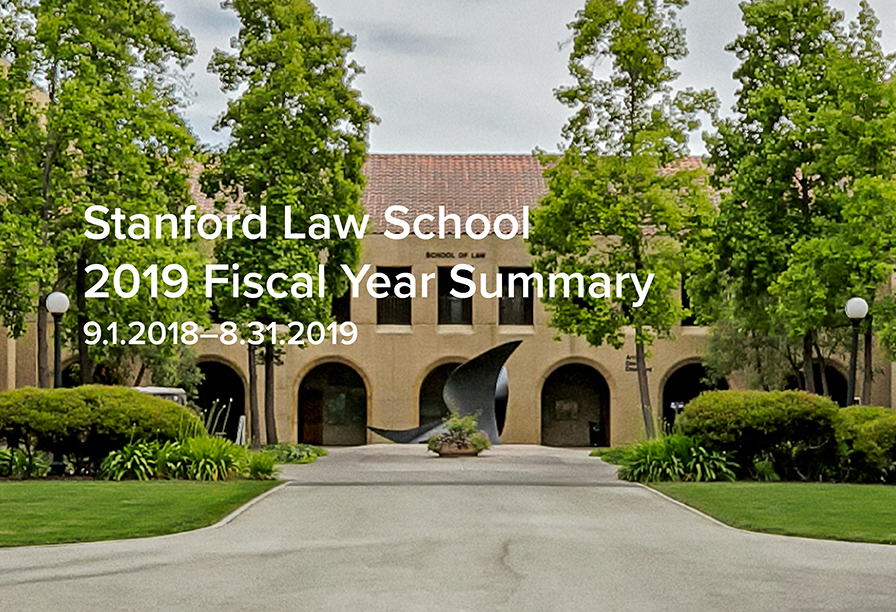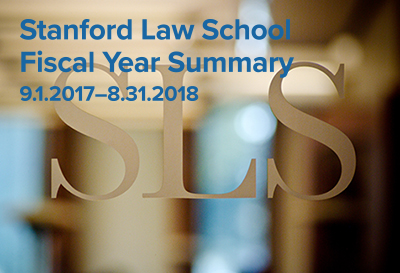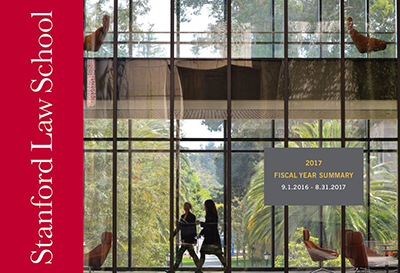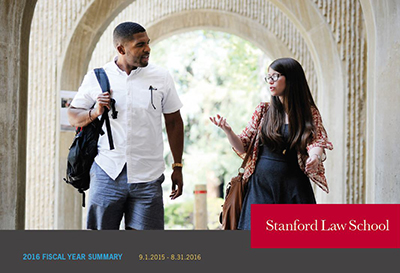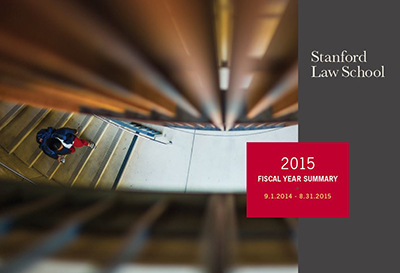
Stanford Law School
2020 Fiscal Year Summary
9.1.2019–8.31.2020
The 2020 fiscal year was full of opportunity for reflection. From responding to the global pandemic to engaging with questions of racial justice, our community has encountered significant challenges. The scope of these problems may often feel daunting, and yet I am encouraged by the daily reminder of the capacity of our students—future alumni—to change the world. I am grateful that our institution nurtures the diverse interests of our students and supports them in their career paths. As we move through this complicated time in our history, I am heartened that these challenges will soon be in the hands of such capable bright minds. Thank you for all you do to support Stanford Law School and our students.
Jenny S. Martinez, Richard E. Lang Professor of Law and Dean

Financial Overview
Philanthropic support allows Stanford Law School to remain at the forefront of legal education. Your generosity helps SLS provide essential financial aid for students and public-service and public-interest alumni, support faculty research on topics of global importance, and develop timely solutions to some of society’s most pressing challenges. Thank you.
Sources of Income
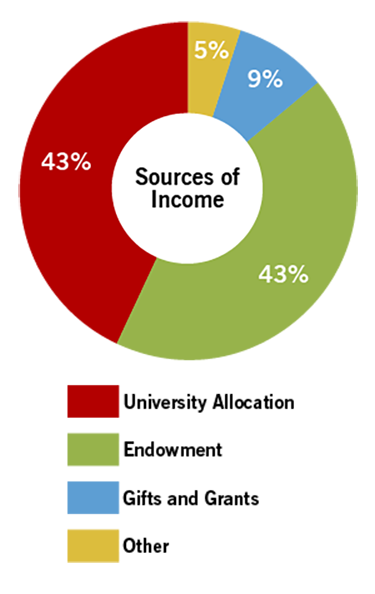
43%
University Allocation
Tuition, fees, and other general funds from the university
43%
Endowment
Assets invested in the Stanford University endowment, paid out at a rate of approximately 5.5% annually
9%
Gifts and Grants
Yearly funding that enhances the student experience through supporting curricular innovations, faculty retention and recruitment, and alumni engagement opportunities
5%
Other
Executive education and conference fees support the law school’s programs and priorities
Total Dollars Raised
$16,718,366*
*This figure includes both outright gifts and multi-year pledges committed during fiscal year 2020. “Total Dollars Raised” ($16,718,366) will be more than “Gifts and Grants” ($7,616,550) since the latter only reflects contributions received and used in fiscal year 2020.
Uses of Income
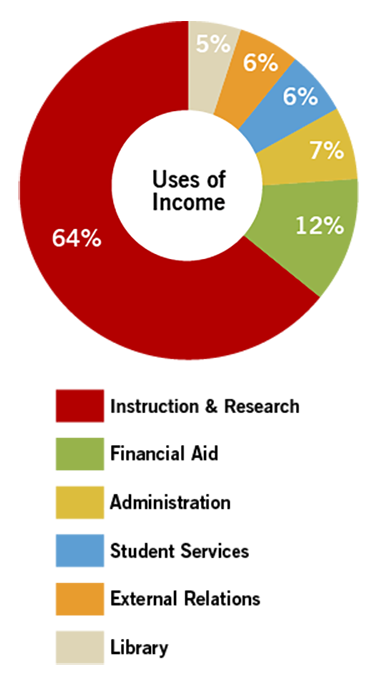
64%
Instruction & Research
Advances the innovative research and unparalleled instruction of our world-class faculty
12%
Financial Aid
Gives the majority of Stanford Law School students financial assistance and scholarships
7%
Administration
Sustains fundamental operations at SLS, including facilities maintenance, information technology, finance, and human resources
6%
Student Services
Supports the student experience beyond the classroom through programs and services such as the Levin Center for Public Service and Public Interest Law and the Office of Career Services
6%
External Relations
Connects SLS’s global alumni community to current students through communications, events, reunions, volunteer opportunities, and international programs
5%
Library
Maintains essential library services and research resources, including databases, subscriptions, and technology updates
Total Law School Budget
$89,762,603

Since graduating from SLS in 1990 I have been a devoted supporter and an active member of the Stanford Law community. This year, I chose to celebrate my 30th reunion by giving back to the institution that has given me so much, including a great legal education and important professional opportunities. Most importantly, SLS is where I met people who remain my best friends to this day and who have enriched my life immeasurably. I'm grateful for my experiences, and happy to support future generations of Stanford Law graduates. I’m also proud that my daughter Eleanor is a sophomore at Stanford, and it gives me great pleasure to watch her enjoy the Stanford community as much as I did.
Richard F. Klawiter, JD '90
Future Lawyers and Leaders
$13.9M
in financial aid was awarded in FY19. Read first-hand how financial aid made a difference to the following SLS students.
Cina, JD/MA ’16
I graduated with a JD and Masters in Education and wanted to do something that involved policy as well as traditional legal practice. My interest didn’t fit what traditional fellowships like to fund. It’s amazing that Stanford fills this gap where other funding opportunities might require you to shape your goals and passions into a predefined package. Stanford said, “We’ll take you as you come. Tell us what you want to do.”
Ultimately, I secured an SLS fellowship working with the Northwest Justice Project as my host organization. I was able to work with their Native American Unit that fellowship year, and it’s where I continue to work today.
Receiving that fellowship was one of the best things that ever happened to me. It allowed me to secure an entry-level position with an organization that does work that matters to me. And, it’s the best job I’ve ever had.
Chris, JD ’12
I wasn’t sure what I wanted to be when I grew up, but I knew what I didn’t want: I didn’t want to do back-breaking labor like the men of my family. People who come from where I come from don’t get opportunities like Stanford. Sometimes it still doesn’t feel real.
The financial aid package I received from SLS was the single most important reason I could attend, and it meant that my debt at graduation was half of what it would have been elsewhere. SLS’s generosity also allowed me to take a public interest summer internship, which gave me the opportunity to work within a school district’s legal office, exploring work I thought might tie together many of my past professional and volunteer experiences.
As a student, I was struck by my classmates: they are uniformly the most brilliant, funny, and engaging people I’ve ever encountered. I was grateful to serve them through a variety of roles, including as president of BLSA. As an alumnus focusing on antitrust and intellectual property litigation at an international firm, I am eager to support the school in its efforts to support today’s students.
Vince, JD ’16
The attacks of September 11, 2001 galvanized in me a commitment to national public service. After graduating from the U.S. Naval Academy, I served as a Marine and deployed twice overseas. I chose law school because the legal profession offered wide-ranging opportunities to continue to serve, in both private practice and the public sector. Saying “yes” to Stanford’s offer of admission was easy – because it was Stanford, and because of the financial aid package I received. Stanford gave me the opportunity both to work at a large firm, with significant pro bono work; to leave private practice for a federal clerkship because of the generous aid package I received, which limited my debt after graduation; and to pursue other, near-limitless public service opportunities in the future.
Faculty Research
350+
news articles, op-eds, blog posts, law review articles, books, and book reviews by faculty and lecturers this year. Read a brief summary of research conducted by three SLS faculty members here.
Stanford RegLab
Stanford’s new RegLab, short for Regulation, Evaluation, and Governance Lab, deploys an interdisciplinary team of legal experts, data scientists, social scientists, and engineers who partner with government agencies to design and evaluate programs, policies, and technologies that modernize governance. RegLab’s director is Professor Daniel E. Ho, the William Benjamin Scott and Luna M. Scott Professor of Law; Professor of Political Science; Senior Fellow, Stanford Institute for Economic Policy Research; and Associate Director of the Stanford Institute for Human-Centered Artificial Intelligence (HAI). RegLab’s ongoing work building the evidence base and technology for effective administrative governance includes projects such as detecting industrial agriculture with computer vision, justice in mass adjudication, using microdata to fight COVID-19 in Detroit, and modernizing tax compliance.
The agriculture-focused project, for example, originated from the fact that, according to the U.S. Environmental Protection Agency, agriculture is the leading source of water pollution, yet industrial-scale livestock farms often evade permitting. In research published in Nature Sustainability, RegLab used high-resolution satellite imagery to identify these farms in North Carolina, and detected 95 percent of existing farms at 10 percent of the current cost of identification. RegLab is now building a comprehensive national map to help meet the goal of cutting farm noncompliance in half. The map can be updated in real time to provide regulators and environmental groups with a realistic way to take action against unpermitted and polluting facilities.
Stanford Center for Law and History
The recently-established Stanford Center for Law and History (SCLH) is built on the principles of interdisciplinary collaboration and academic rigor. The center brings together faculty, postdocs, and students from across the globe to participate in a broad range of conferences, workshops, and lectures devoted to examining the multifaceted interrelationships between law and history. Professor Amalia D. Kessler, MA ’96, PhD ’01, the Lewis Talbot and Nadine Hearn Shelton Professor of International Legal Studies, and Associate Dean for Advanced Degree Programs, is the Director of SCLH. In addition to a Yale Law School JD, Professor Kessler holds an MA in history and a PhD in European history from Stanford.
One example of the cutting-edge scholarship emerging from the center includes the May 2019 conference in anticipation of the 19th Amendment’s centennial. The conference, Legal Histories and Legacies of the 19th Amendment, honored women trailblazers in the law, and offered sessions on suffrage movements, immigration and family citizenship, and a keynote conversation, “Women & Law, Past & Present.” The gathering brought together scholars from academic institutions across the country, including notable women judges who led the discussion: Judge Michelle Friedland of the U.S. Court of Appeals for the Ninth Circuit, Justice Tanya R. Kennedy of the New York Supreme Court Civil Branch, and immediate past president of the National Association of Women Judges, and Judge Yvonne Gonzalez Rogers of the U.S. District Court, Northern District of California.
Stanford Center for Racial Justice
The Stanford Center for Racial Justice (SCRJ) was established in 2020 by co-founders Professor Ralph Richard Banks, Jackson Eli Reynolds Professor of Law, and Diane T. Chin, Acting Director of SCRJ. The center, located at Stanford Law School, seeks to educate the entire Stanford community to become partners in the quest to eradicate racism, and to further democracy, liberty, and justice. Through three channels, Research & Policy, Training & Development, and Strategic Communications, the SCRJ will effect systemic change at Stanford and in the nation broadly.
The SCRJ will create a ripple effect with its work in training and development. While law students will be research partners in creating policy recommendations, graduate and undergraduate students at Stanford will be participants in the center’s workshops and training, ensuring that Stanford graduates are in the vanguard of advancing a new racial norm in every job they hold. The center’s racial justice curriculum will equip students with the experience, perspective, and skill set they will need as they join the workforce and attain leadership positions nationwide. In this way, the SCRJ’s work, teaching, and research will serve to challenge racism across the country.
The Law Fund
2,230
alumni and friends made gifts to SLS in 2020, enabling the following notable initiatives, among others.
Postgraduate Public Interest Fellowships
Every year, support from the Law Fund provides a critical foundation for the activities of Stanford Law School. This remains true as we face the myriad effects of the coronavirus pandemic. The Law Fund ensures that SLS is both nimble and well-grounded, supporting students in the face of changing financial circumstances while remaining steadfast in our mission to provide an excellent legal education and cultivate world-class research.
Postgraduate public interest fellowships enable our graduates to work full-time for a year in a law-related endeavor to further the public interest. These include both general postgraduate fellowships on any public interest issue and those targeting specific substantive areas, for example, immigration, labor law, and criminal justice.
Financial Aid
Financial aid makes an SLS education accessible to all of our students, regardless of their means. The law school has also responded to the unforeseen financial challenges facing our students due to the pandemic, including providing financial assistance for plane tickets to those students who otherwise could not afford to return home, as well as technological support for online courses.
Experiential Learning
Experiential learning is a hallmark of an SLS education. Through programs like the Mills Legal Clinic and the Law and Policy Lab, students gain the hands-on training they need to prepare for their professional futures.

